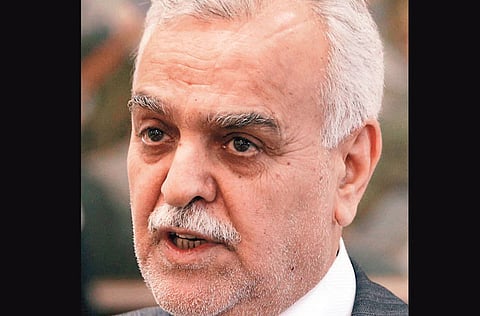Iraq hits out at Kurds, Qatar
Baghdad tells Doha to send back Al Hashemi who faces terror charges

Dubai: In the latest sign of worsening ties between the Iraqi central government and Kurdistan and its Arab neighbours, Baghdad yesterday lambasted the autonomous region's move to allow Sunni Vice-President Tarek Al Hashemi, who faced terror charges, to travel to Qatar and to stop oil exports.
Iraqi Deputy Prime Minister Hussain Shahristani asked Doha to send Al Hashemi back in what many experts described as part of ongoing tensions between the two sides amid sectarian strains and different approaches to the Syrian crisis.
"Qatar should review its position and send Al Hashemi back to Iraq to stand trial," Shahristani was quoted as saying at a press conference. Qatar's acceptance of Al Hashemi was "unacceptable", he added.
Shahristani said Kurdistan committed a "clear challenge to law and justice" by allowing Al Hashemi to leave the country. Al Hashemi had been holed up in Kurdistan since last December, when Iraqi officials accused him, a day after the US troop withdrawal, of running death squads against Shiites, government officials and security forces. He denies the charges, which he says are politically motivated. Kurdish officials have repeatedly rejected Baghdad's requests to hand over the vice-president.
Al Hashemi swiftly rejected Baghdad's demand upon arrival in Doha. He told AFP, "There has not been a judicial decision against me by any court, and the demand does not respect Article 93 of the constitution, which provides me with immunity."
Al Hashemi's case has divided Iraqi politicians.
"His trip to Qatar is his right as a vice-president," Talal Al Zoubai, an Iraqi MP from the Iraqiya bloc, said.
"The accused is innocent until he is proven guilty…. And we are confident, as an Iraqi bloc and all the national parties, that the man is innocent and far from these accusations… it is a political vendetta," he told Gulf News.
Other Arab political experts believe Al Hashemi's trip to Qatar is likely to deepen already existing tensions between Iran and the neighbouring Gulf states.
"There is an attempt at media escalation by the Iraqi government towards Qatar in particular," said Mohammad Ezz Al Arab, a researcher at the Arab and regional unit at the Cairo-based Al Ahram Strategic Studies Centre. "This is only one of the cases," between Iraq and the Arab states, he told Gulf News.
Oil exports halted
Sectarian tension, trading accusations of interfering in each other's internal affairs, Baghdad's strong relations with Iran, and its support for the Syrian regime of Bashar Al Assad, who is criticised by the Gulf countries for crushing the year-long protests, are among the main reasons for the ongoing tensions, added Ezz Al Arab.
Baghdad also criticised Kurdistan for stopping its crude oil exports on Sunday after arguing the central government had withheld $1.5 billion owed to foreign oil companies working in the region.



